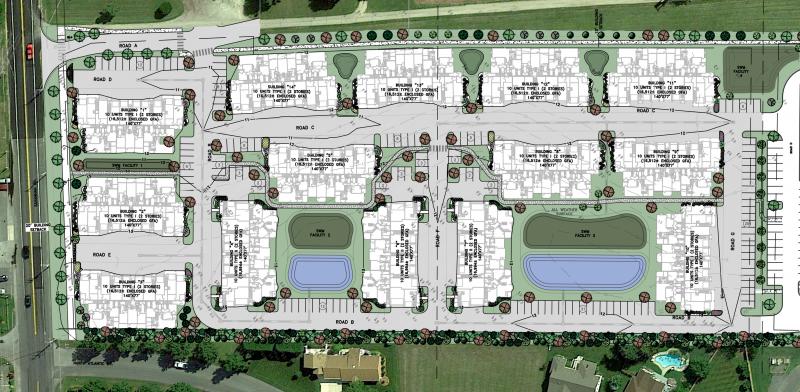Dutchman’s Harvest workforce housing project is set to move forward with approval from Lewes Mayor and City Council.
Officials unanimously approved the site plan Nov. 4 for the 140-unit multifamily home community, planned for an 8-acre parcel along Savannah Road, just west of the Lewes-to-Georgetown Trail crossing.
Developer Preston Schell of Ocean Atlantic worked with officials to fine-tune restrictive covenants outlining requirements prospective buyers and renters must meet in order to qualify to live in the community. Schell will pay Diamond State Community Land Trust to manage the community to ensure all requirements are being met.
Diamond State will also buy up to 42 units from the developer at direct cost and resell the units considerably lower than the anticipated price for the remaining 98 units. The plan calls for 14 buildings of 10 units each. One-, two- and three-bedroom units will be offered.
Schell’s goal is for the one-bedroom units to start in the low $200,000s, while the larger units will be in the low to mid-$300,000 range. The units Diamond State purchases to resell will be priced lower, possibly starting in the mid-$100,000 range, Schell said.
Schell is targeting summer 2020 to break ground on the project. It will be built in phases over three years, which works well for Diamond State in its effort to find funding, said Helen McAdory, executive director of Diamond State. She said she has already secured about 50 percent of the funding to purchase the units.
Diamond State will offer its units to buyers who make 60 percent to 80 percent of the average median income of Sussex County – $68,700. Schell’s remaining units will be targeted for people making up to 120 percent of the area median income.
To live in Dutchman’s Harvest, all buyers must be employed in Sussex County and work at least 30 hours per week. The restrictive covenant requires 40 units to be reserved for people working east of Route 1 from New Road to Kings Highway for the first nine months after reservations begin to be taken.
The covenant also allows a single business or its affiliates to purchase up to five units for employees. No more than 30 total units can go to businesses, and their tenants must meet the same requirements as buyers.
Unlike other projects Schell is involved in, this project is almost entirely cost-based. In an effort to keep prices down, he said, units will be sold 15 percent over the cost to build.
“Typically when we do a housing development, our price is largely market-based, not cost-based,” he said. “If [units] end up being $50,000 below market … then that’s a good thing.”
Because the city is a partner in the project, Schell said, he’s open to an audit to ensure he does not exceed a 15 percent profit.
“At the end of the day, we’re going to do a full accounting … of all the numbers and if we’ve made anything above 15 percent, we’re just going to give it in a check to Diamond State Community Land Trust,” he said.
Schell said eastern Sussex County is in desperate need of more affordable housing.
“Every time we sell a home to a retiree, more jobs are created in this area, whether it be the servers at local restaurants, nurses at Beebe, or baristas at our favorite coffee shops,” he said. “As prices continue to increase in the coastal market, the local workforce is being forced to live farther from where they work.
“This causes many problems, not the least of which is traffic.”
He said local land-use jurisdictions and the development community need to take some of the gains from a strong, local economy and use them to help create opportunities for housing for the local workforce.
He said Sussex County officials and eastern Sussex municipalities need to create zoning ordinances that outline a clearer and more predictable path to approvals for projects incorporating more affordable housing, including offering incentives.
“I don’t know if we’ll see many more projects like Dutchman’s Harvest any time soon,” he said. “Why would a developer pursue a less profitable, more complicated and tougher-to-get-approved project if he/she could just keep building houses for the seemingly boundless market of rich retirees moving into the area?” he said. “The short answer is, they won’t.”
Another challenge, he said, is often from neighbors who do not want development. In the case of Dutchman’s Harvest, he said, the neighbors were open to development and willing to discuss plans.
“The vast majority of the neighbors seemed to be genuinely interested in just making sure they were aware of what we were doing and in providing some comments/ideas to mitigate the impact the project would have on their homes,” he said. “When they felt comfortable they knew what was going on and that we had made a sincere attempt to address their concerns, they stopped objecting to the project.”
Schell recently proposed another workforce housing project in Milton with restaurateur Eric Sugrue. He said the project will be similar to Dutchman’s Harvest, but it will not include the Diamond State component.
“The units will be market rate and attractive, but with a density and design that allow us to offer them at relatively affordable prices to our tenants and buyers,” he said. “Also, we expect the Milton project to have a rental component as well as a possible for-sale component.”
SIDEBAR
BPW impact fee issue resolved
In September, Dutchman’s Harvest developer Preston Schell went before the Lewes Board of Public Works seeking a waiver or significant reduction in impact fees for the project.
After working with BPW staff and engineers, Schell said, he was able to reduce the cost by redirecting sewer for his neighboring project, a senior living facility called The Lodge at Historic Lewes, through Dutchman’s Harvest.
“We were able to justify making the senior living project pay for a big chunk, 43.5 percent, of the cost of the downstream improvements Lewes BPW was asking Dutchman’s Harvest to pay for,” Schell said. “The BPW received the same amount of money for the same improvements, but we were able to spread that cost over both the workforce housing and senior living projects, thereby lowering the net cost to the workforce housing.”
Schell said the result is a $4,500 to $5,000 savings per unit.
At the Nov. 4 mayor and city council meeting, Schell asked the city officials to also consider lowering costs for permits and other related fees. Since workforce housing is a goal of the city in its comprehensive plan, he said, it’s in their best interest to keep the costs down.
“I’d love for [the city] to look at certain fees that truly cost the amount it’s charging,” he said.
Nick Roth is the news editor. He has been with the Cape Gazette since 2012, previously covering town beats in Milton and Lewes. In addition to serving on the editorial board and handling page layout, Nick is responsible for the weekly Delaware History in Photographs feature and enjoys writing stories about the Cape Region’s history. Prior to the Cape Gazette, Nick worked for the Delmarva Media Group, including the Delaware Wave, Delaware Coast Press and Salisbury Daily Times. He also contributed to The News Journal. Originally from Boyertown, Pa., Nick attended Shippensburg University in central Pennsylvania, graduating in 2007 with a bachelor’s degree in journalism. He’s won several MDDC awards during his career for both writing and photography. In his free time, he enjoys golfing, going to the beach with his family and cheering for Philadelphia sports teams.

















































